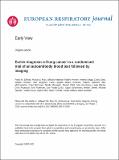Files in this item
Earlier diagnosis of lung cancer in a randomised trial of an autoantibody blood test followed by imaging
Item metadata
| dc.contributor.author | Sullivan, Frank M. | |
| dc.contributor.author | Mair, Frances S. | |
| dc.contributor.author | Anderson, William | |
| dc.contributor.author | Armory, Pauline | |
| dc.contributor.author | Briggs, Andrew | |
| dc.contributor.author | Chew, Cindy | |
| dc.contributor.author | Dorward, Alistair | |
| dc.contributor.author | Haughney, John | |
| dc.contributor.author | Hogarth, Fiona | |
| dc.contributor.author | Kendrick, Denise | |
| dc.contributor.author | Littleford, Roberta | |
| dc.contributor.author | Mcconnachie, Alex | |
| dc.contributor.author | McCowan, Colin | |
| dc.contributor.author | Mcmeekin, Nicola | |
| dc.contributor.author | Patel, Manish | |
| dc.contributor.author | Rauchhaus, Petra | |
| dc.contributor.author | Ritchie, Lewis | |
| dc.contributor.author | Robertson, Chris | |
| dc.contributor.author | Robertson, John | |
| dc.contributor.author | Robles-Zurita, Jose | |
| dc.contributor.author | Sarvesvaran, Joseph | |
| dc.contributor.author | Sewell, Herbert | |
| dc.contributor.author | Sproule, Michael | |
| dc.contributor.author | Taylor, Thomas | |
| dc.contributor.author | Tello, Agnes | |
| dc.contributor.author | Treweek, Shaun | |
| dc.contributor.author | Vedhara, Kavita | |
| dc.contributor.author | Schembri, Stuart | |
| dc.date.accessioned | 2021-07-29T23:36:40Z | |
| dc.date.available | 2021-07-29T23:36:40Z | |
| dc.date.issued | 2021-01-01 | |
| dc.identifier | 269472207 | |
| dc.identifier | 82a18aa2-f4d4-49e0-b0cc-0674e82071f7 | |
| dc.identifier | 32732334 | |
| dc.identifier | 85092169225 | |
| dc.identifier | 000625355700008 | |
| dc.identifier.citation | Sullivan , F M , Mair , F S , Anderson , W , Armory , P , Briggs , A , Chew , C , Dorward , A , Haughney , J , Hogarth , F , Kendrick , D , Littleford , R , Mcconnachie , A , McCowan , C , Mcmeekin , N , Patel , M , Rauchhaus , P , Ritchie , L , Robertson , C , Robertson , J , Robles-Zurita , J , Sarvesvaran , J , Sewell , H , Sproule , M , Taylor , T , Tello , A , Treweek , S , Vedhara , K & Schembri , S 2021 , ' Earlier diagnosis of lung cancer in a randomised trial of an autoantibody blood test followed by imaging ' , European Respiratory Journal , vol. 57 , no. 1 , 2000670 . https://doi.org/10.1183/13993003.00670-2020 | en |
| dc.identifier.issn | 0903-1936 | |
| dc.identifier.other | crossref: 10.1183/13993003.00670-2020 | |
| dc.identifier.other | ORCID: /0000-0002-9466-833X/work/78528372 | |
| dc.identifier.other | ORCID: /0000-0002-6623-4964/work/78528230 | |
| dc.identifier.uri | https://hdl.handle.net/10023/23682 | |
| dc.description | Funding: Scottish Government Health and Social Care Directorate, and Oncimmune Ltd. | en |
| dc.description.abstract | The EarlyCDT-Lung test is a high specificity blood-based autoantibody biomarker that could contribute to predicting lung cancer risk. Here we report on the results of a phase IV biomarker evaluation of whether using the EarlyCDT-Lung test and any subsequent CT scanning to identify those at high risk of lung cancer reduces the incidence of patients with stage III/IV/Unspecified lung cancer at diagnosis, compared with the standard clinical practice at the time the study began. ECLS was a randomised controlled trial of 12 208 participants at risk of developing lung cancer in Scotland. The intervention arm received the EarlyCDT-Lung test and, if test positive, low-dose CT scanning six-monthly for up to 2 years. EarlyCDT-Lung test negative and control arm participants received standard clinical care. Outcomes were assessed at 2 years post-randomisation using validated data on cancer occurrence, cancer staging, mortality and comorbidities. At 2 years, 127 lung cancers were detected in the study population (1.0%). In the intervention arm, 33/56 (58.9%) lung cancers were diagnosed at stage III/IV compared to 52/71 (73.2%) in the control arm. The hazard ratio for stage III/IV presentation was 0.64 (95% confidence interval 0.41, 0.99). There were non-significant differences in lung cancer and all-cause mortality after 2 years. ECLS compared EarlyCDT-Lung plus CT screening to standard clinical care (symptomatic presentation), and was not designed to assess the incremental contribution of the EarlyCDT-Lung test. The observation of a stage-shift towards earlier-stage lung cancer diagnosis merits further investigations to evaluate whether the EarlyCDT-Lung test adds anything to the emerging standard of LDCT. | |
| dc.format.extent | 11 | |
| dc.format.extent | 7796944 | |
| dc.language.iso | eng | |
| dc.relation.ispartof | European Respiratory Journal | en |
| dc.subject | Lung cancer | en |
| dc.subject | Diagnosis | en |
| dc.subject | Autoantibodies | en |
| dc.subject | Screening | en |
| dc.subject | RC0254 Neoplasms. Tumors. Oncology (including Cancer) | en |
| dc.subject | NDAS | en |
| dc.subject | BDC | en |
| dc.subject | R2C | en |
| dc.subject | ~DC~ | en |
| dc.subject | SDG 3 - Good Health and Well-being | en |
| dc.subject.lcc | RC0254 | en |
| dc.title | Earlier diagnosis of lung cancer in a randomised trial of an autoantibody blood test followed by imaging | en |
| dc.type | Journal article | en |
| dc.contributor.institution | University of St Andrews. School of Medicine | en |
| dc.contributor.institution | University of St Andrews. Sir James Mackenzie Institute for Early Diagnosis | en |
| dc.contributor.institution | University of St Andrews. Population and Behavioural Science Division | en |
| dc.identifier.doi | 10.1183/13993003.00670-2020 | |
| dc.description.status | Peer reviewed | en |
| dc.date.embargoedUntil | 2021-07-30 |
This item appears in the following Collection(s)
Items in the St Andrews Research Repository are protected by copyright, with all rights reserved, unless otherwise indicated.

